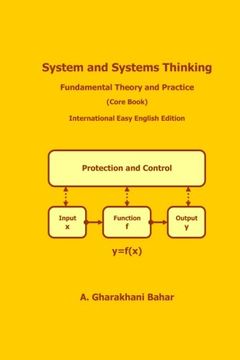System and Systems Thinking - Fundamental Theory and Practice: (Core Book) (Paperback) (in English)
Synopsis "System and Systems Thinking - Fundamental Theory and Practice: (Core Book) (Paperback) (in English)"
A New Look! A Fundamental Approach! "System" is used for many objective or subjective things and carries a "concept" with itself than a device name like "computer". Based on the book, many evidences show that we are living in a world of "objects" and their related "events". Objects are the things that have their own "order" or properties in the "space". Events are the happenings in relation with the things that have their own "rule" or methods in the "time". "News" as daily "hot" subjects and language sentences as tool to explain the world, all are about the objects and their related events! In the news, we have "this..." or "that..." and "this happened ..." or "that happened ...". Also in the natural languages, "nouns" are the objects and "verbs" are their related events! Without the "nouns" and "verbs", the language has no functionality in its totality! Objects and events or nouns and verbs are mutually related. Without objects or nouns no event or verb is meaningful to be occurred or done. Also if objects have come into existence in some event in some time, then without events no object can be imagined to be existed! "Adjectives" are the "orders" governing the objects and "adverbs" are the "rules" governing their related events. If sentences can have no "adjectives" or "adverbs" (no order or rule as "chaos"!), but without "nouns" and "verbs", no concept can be transferred by a sentence! Also nouns imply "space" and verbs imply "time", but "adjectives" and "adverbs" some how imply "space and time". In most studies, objects usually are consisted of some related parts and their related events of some related stepwise actions. Based on this, objects and their related events (in sum) have their own "structure" and "structural order" and "behavior" and "behavioral rule". Structural order and behavioral rule is the "discipline" governing them. Discipline causes the things (as objects with their related events) to be existed and to continue their existence as they are! So, things have their own "structure", "behavior" and "discipline" as a "whole". With "noun", we usually remember the image, shape or "structure" and with "verb", the application, function or "behavior" of the objects. "Adjective" reminds us the "order" in the object and "adverb", the "rule" in its related event. Normally, structures are possible by "matter" and behaviors by "energy". In the nature, discipline is deterministic and usually is possible by the thing's "structural order due to matter" or "behavioral rule due to energy". For example, a mountain has its own structural order and a river its own behavioral rule! But in the living things that besides the matter and energy also "information" can be handled, discipline is partly non-deterministic and information is the agent of the non-deterministic part of discipline. For this, consider a boat in a river with a boatman in it! So, "matter", "energy" and "information" are the most basic resources that make the things. Based on the above concepts, "system" in its most general and complete concept is any "objective" or "subjective" thing as a "whole", consisted of some "ordered related parts" as "structure" and some "ruled stepwise related actions" as "behavior". The wholeness of system is greater than the sum of its parts. But, in practice, our purpose of system might to be structure, behavior or discipline (order or rule) or a combination of them. This is why "system" has similar meanings in the dictionaries. Systems usually have their own certain "application" (by structure), "functionality" (by structure and behavior) or "goal" to reach (by structure, behavior and discipline by the aid of information). Read more in the 45 minutes Kindle format short review or even more about 500+ key concepts in the main book. Main book is available in Kindle and Paperback formats with or without extra section including more teaching material for the instructors and students who wish to use the book in a teaching

